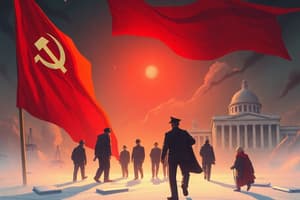Podcast
Questions and Answers
O que aconteceu com o ritmo da globalização desde 2008?
O que aconteceu com o ritmo da globalização desde 2008?
- Tornou-se imprevisível
- Acelerou
- Estagnou (correct)
- Diminuiu
Quantas medidas restritivas ao comércio foram impostas no ano passado?
Quantas medidas restritivas ao comércio foram impostas no ano passado?
- Cerca de 1.000
- Mais de 5.000
- Aproximadamente 3.000 (correct)
- Menos de 500
Por que a instabilidade global em locais como a península coreana e o Afeganistão não pode ser compreendida sem recorrer à Guerra Fria?
Por que a instabilidade global em locais como a península coreana e o Afeganistão não pode ser compreendida sem recorrer à Guerra Fria?
- Por causa de eventos recentes sem conexão histórica
- Devido à influência de organizações internacionais na região
- Por razões econômicas
- Porque a origem desses dilemas está relacionada à Guerra Fria (correct)
Quais são as instituições principais enraizadas na era bipolar mencionadas no texto?
Quais são as instituições principais enraizadas na era bipolar mencionadas no texto?
Qual é um legado da Guerra Fria mencionado no texto?
Qual é um legado da Guerra Fria mencionado no texto?
O que caracterizou a era da Guerra Fria em termos de comércio global?
O que caracterizou a era da Guerra Fria em termos de comércio global?
Quais são algumas das consequências duradouras da Guerra Fria mencionadas no texto?
Quais são algumas das consequências duradouras da Guerra Fria mencionadas no texto?
Quais são algumas das instituições importantes que foram moldadas durante a era bipolar da Guerra Fria?
Quais são algumas das instituições importantes que foram moldadas durante a era bipolar da Guerra Fria?
Em relação ao comércio mundial, o que aconteceu com o volume de comércio entre os blocos opostos durante a Guerra Fria?
Em relação ao comércio mundial, o que aconteceu com o volume de comércio entre os blocos opostos durante a Guerra Fria?
O que impulsionou o rápido crescimento do comércio global após o fim da Guerra Fria?
O que impulsionou o rápido crescimento do comércio global após o fim da Guerra Fria?
Flashcards are hidden until you start studying
Study Notes
The Cold War, a period of severe tension between the United States and the Soviet Union, lasted from the late 1940s to the late 1980s. During this time, the world was divided into two opposing spheres of influence, with the US and USSR as the dominant superpowers. The end of the Cold War marked a significant shift in global trade and the rise of hyper-globalization in the 1990s and 2000s.
The Cold War era was characterized by the ideological and economic rivalry between the two superpowers, resulting in a fragmented global economy with trade and investment heavily influenced by geopolitical considerations. Trade between opposing blocs dropped from around 10-15 percent to less than 5 percent of global trade during the Cold War.
The legacy of the Cold War includes nuclear weapons and related arms control and non-proliferation treaties, local conflicts with long-lasting consequences, and international institutions that continue to play a key role in shaping the international system. The major institutions that govern the 'West', such as NATO and the EU, are both rooted in the bipolar era, and the sense of community, belonging, and shared values that characterise them was forged throughout the decades.
The end of the Cold War coincided with a period of rapid expansion in global trade and economic integration, driven by technological innovations, unilateral and multilateral trade liberalization, and geopolitical and institutional changes. However, since 2008, the pace of globalization has stagnated, with trade to GDP stabilizing and economic integration levels not seen before.
Despite the end of the Cold War, geopolitical risks have intensified over the past five years, with around 3,000 trade restricting measures imposed last year, nearly three times the number imposed in 2019. The world is once again experiencing fragmentation in trade and investment flows, with countries strategically competing with amorphous rules and without an effective referee.
The current instability in global hotspots, such as the Korean peninsula and Afghanistan, cannot be understood without turning to the Cold War for the roots and causes of today's dilemmas. The major institutions that govern the 'West', such as NATO and the EU, are both rooted in the bipolar era, and the sense of community, belonging, and shared values that characterise them was forged throughout the decades.
In conclusion, the Cold War had a profound impact on the world, shaping the international system in tangible ways that remain relevant today. Its legacy can be seen in nuclear weapons and related arms control and non-proliferation treaties, local conflicts with long-lasting consequences, and international institutions that continue to play a key role in defining the global order.
Studying That Suits You
Use AI to generate personalized quizzes and flashcards to suit your learning preferences.




